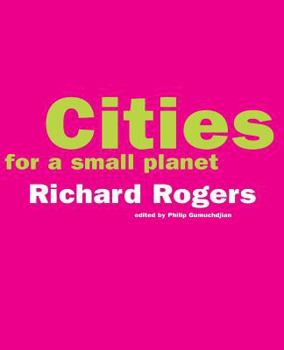Cities for a Small Planet
Select Format
Select Condition 
Book Overview
Nothing else damages the earth's environment more than our cities. As the world's population has grown, our cities have burgeoned, and their impact on the environment worsened. Meanwhile, from the isolated, gated communities within Houston and Los Angeles, to the millions of residents of Bombay living in squalor, the city has failed to serve its ideal functions as the cradle of civilization, the engine of culture, and the inspiration for community...
Format:Paperback
Language:English
ISBN:0813335531
ISBN13:9780813335537
Release Date:July 1998
Publisher:Basic Books
Length:196 Pages
Weight:0.60 lbs.
Dimensions:0.5" x 7.5" x 9.3"
Customer Reviews
5 ratings
future
Published by Thriftbooks.com User , 17 years ago
There's probably a great truth in the fact that the last 50 years of planning have enrich few and impoverished many. Zoning is simple, clear, fast and economically definable, but it isolates the people who are destined to live there, and enslaves them to the use of car. Overlapping and dense urbanism is historically a step back, is more work for planners, more difficult to understand for the laymen and developers and will cost more, but it will ultimately favor humane contact, regenerate sense of community, diminish the slavery of people on machine and last but not least reduce pollution. We have to reconsider the word coined by the Polish American Architect Lubicz of Nycz: Urbantecture. Urbanism & architecture are very delicate matters, intimately tided they create the frame for the world we live in. This is a great book for planner, politicians and people, because everybody today is oblige to look at cities as sustainable places where life can prosper only in respect of nature.
...But I like my life in the suburbs
Published by Thriftbooks.com User , 18 years ago
"Cities for a Small Planet give me the reassurance that there are influential people trying to reduce the destructive impact of human activities on the world. The case study of Curitiba, Brazil is particularly inspirational. Author Richard Rogers looks for ways to make city centers more sustainable and points out the importance of public space within a city. He makes a case against single-use developments, the sprawl of the suburbs and the need for automobiles. I can't help but to wonder, though, about the average family living in a suburb in their own house with a backyard garden, two dogs and a cat. Those average people are quite happy to be away from the city centers, from the panhandlers and predators, from unsafe feelings while riding public transportation, from the sounds of police sirens and honking horns. Will dense sustainable city developments change that? Not everyone is cut out to live in dense cities. A more appropriate question (at least in the United States) might be, "What can we do to make our suburbs more sustainable?" Just an aside: I found the font size of this book to be a bit on the small side, and the captions under the pictures to be small to the point of near unreadability.
small in size, large in wisdom
Published by Thriftbooks.com User , 24 years ago
It is a good book, small but with lots of information. It introduces in a simple form the urban problems of the world and tries to focus in it's solutions. After I read it I showed it to teachers at my school and they now quote it in class.
well designed and with great insight
Published by Thriftbooks.com User , 25 years ago
Unusual and very well thought-out propositions for the architectural/urbanization problems that arise today as society everywhere struggles with increasing overpopulation. EWspecially noteworthy is the inclusion of small town issues, a topic normally overlooked by other architects/scholars who write on urban planning. Some interesting research, and of course the intriguing sketches and drawings I associate with Rogers, Foster, Piano, and all thoes other postindustrial architects. It's a small little book that is great for reading on the plane. Usually something not too common with architecture books.
excellent, innovative interesting ideas
Published by Thriftbooks.com User , 25 years ago
After reading this book, I wanted to pack my bags and head to London to study with Richard Rogers. His observations on the importance of balancing population, resources and the environment is right on. He identifies the need for compact cities, but seeks to reinvent the dense city model to be a cleaner, greener, more integrated place. Rogers pays specific attention to positive social changes that compact cities can make, and he addresses the importance of regionalism to acheiving sustainability goals. Also, he explains how proximity allows for creative reuse of resources and efficient building design. The book is unique; Rogers makes concrete suggestions and offers actual examples of ways to acheive sustainability.





